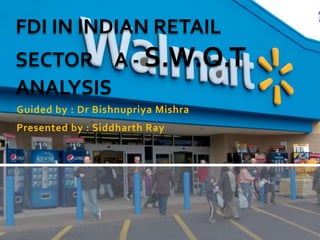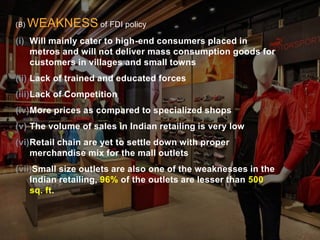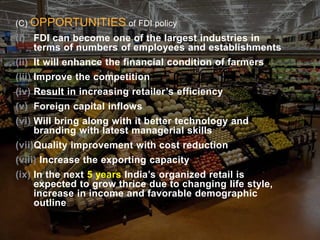Fdi in indian retail sector a s.w.ot analysis
- 1. Guided by : Dr Bishnupriya Mishra Presented by : Siddharth Ray FDI IN INDIAN RETAIL SECTOR A - S.W.O.T ANALYSIS
- 2. ’ü▒ Foreign direct investment (FDI) is a direct investment into production or business in a country by an individual or company of another country, either by buying a company in the target country or by expanding operations of an existing business in that country . ’ü▒ It usually involves participation in management , joint venture ,transfer of technology and expertise. ’ü▒ FDI can be used as one measure of growing economic globalization. What is FDI?
- 3. SINGLE BRAND RETAIL : It implies that a retail store with foreign investment can only sell one brand. Eg. Nokia , Reebok and Adidas. MULTI BRAND RETAIL : Retail store can sell multiple brands under one roof. Global retailers like Wal ŌĆō Mart , Carrefour and Tesco can open stores offering a wide range of household items and grocery directly to consumers in the same way as the ŌĆ£ KiranaŌĆØ stores.. Single and Multiple Brand Retail
- 4. ’ü▒ Retail industry ŌĆō Second largest employer ( with an estimated 35 million people engaged by the industry). ’ü▒ The Union Cabinet on 24th Nov 2011 proposed to increase FDI in multi brand to 51%.However government was put to hold after strong opposition from several political parties , including NDA and Trinamool Congress. ’ü▒ New policy will allow multi brand foreign retailers to set up shop only in cities with a population of more than 10 lakhs as per the 2011 census.( there are 53 such cities) ’ü▒ The single brand retail FDI limit was increased from 51% to 100% Present shape of FDI in retail in India
- 6. French MNC Retailer InsideWalmart (USA) British MNC Retailer
- 7. (A)STRENGTHS of FDI Policy (i) Fast growing economy (ii) Employment opportunities will increase both directly and indirectly (iii)Farmers get better prices for their products through improvement of value added food chain (iv)It will also greatly contribute to large scale investments in the real estate sector (v) Large domestic market with an increasing middle class and potential customers with purchasing power (vi)The consumer get a better product at cheaper price ,so consumers get value for their money (vii)Presence of big industrial houses can absorb losses S.W.O.T ANALYSIS
- 8. (B) WEAKNESS of FDI policy (i) Will mainly cater to high-end consumers placed in metros and will not deliver mass consumption goods for customers in villages and small towns (ii) Lack of trained and educated forces (iii)Lack of Competition (iv)More prices as compared to specialized shops (v) The volume of sales in Indian retailing is very low (vi)Retail chain are yet to settle down with proper merchandise mix for the mall outlets (vii)Small size outlets are also one of the weaknesses in the Indian retailing, 96% of the outlets are lesser than 500 sq. ft.
- 9. (C) OPPORTUNITIES of FDI policy (i) FDI can become one of the largest industries in terms of numbers of employees and establishments (ii) It will enhance the financial condition of farmers (iii) Improve the competition (iv) Result in increasing retailerŌĆÖs efficiency (v) Foreign capital inflows (vi) Will bring along with it better technology and branding with latest managerial skills (vii)Quality improvement with cost reduction (viii) Increase the exporting capacity (ix) In the next 5 years IndiaŌĆÖs organized retail is expected to grow thrice due to changing life style, increase in income and favorable demographic outline
- 10. (D) THREATS of FDI policy (i) Threat to the survival of small retailers like ŌĆślocal kiranaŌĆÖ or ŌĆśmom n popŌĆÖ store (ii) Work will be done by Indians and profits will go to foreigners (iii)Difficult to target all segments of society (iv) Lack of uniform tax system for organized retailing (v) Problem of car parking in urban areas is serious concern (vi) Sector is unable to employ retail staff on contract basis (vii)The unorganized sector has dominance over the organized sector because of low investment needs
- 11. ’ü▒ FDI in retail is going to attract many foreign players but the GOI must welcome them with a talented pool of Human resources ’ü▒ Protection must be given to small and medium retailers as retailing is their source of livelihood ’ü▒ The government must properly discuss about the pros and cons of allowing 51% FDI in multi brand retail with a law in place to control unfair competition ’ü▒ FDI will control inflation rate since it will prevent the farm wastage which at present is around 30%-40% of total produce Conclusion












